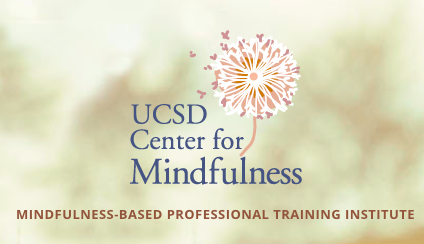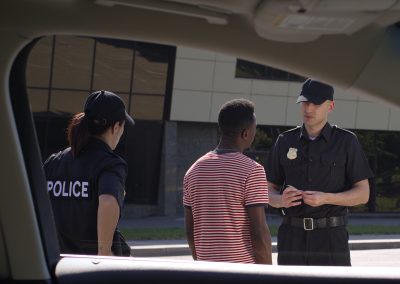[Publisher’s Note: Calibre Press is interested in reducing, and acknowledging, stress in the work of first response. To that end we have published many articles on mindfulness and meditation, which are a couple of complimentary tools for enhancing situational awareness and diminishing the harmful effects of stress on our lives. One of the leaders in bringing mindfulness to first responders is Lt. Richard Goerling, who is leading upcoming peer coach training at UCSD’s Center for Mindfulness, aimed at first responders who want to bring this concept back to their agency. You can learn more and register here. Following is a conversation I recently had with Lt. Goerling.]
Mindfulness is one of those words that’s so trendy and misunderstood that I sometimes wonder if we know what we’re talking about. How do you define it?
At the end of the day, mindfulness is just a word. We all bring our own ideas and judgements around this term, and this often creates an aversive reaction in our community of first responders. We see mindfulness often with visions of unrealistic pleasantness and we move along. An operational definition of mindfulness might be “the practice of present moment attention without unregulated judgement, unregulated emotion, or habitual elaboration.” In other words, focused, relaxed, and taking in the landscape as it is rather than how we might expect it to be.
What’s most important here is looking beyond the fluff to the fascinating science behind training in awareness and compassion (mindfulness). In our training around mindfulness for first responders, we train simply to three areas: our thought stream (mind), our emotions, and our body.
Tell me a little bit about your journey.
I enlisted in the Coast Guard shortly after high school and ever since I’ve been a first responder in one capacity or another. I’ve taken a keen interest in human performance, having experienced my fair share (or perhaps more than!) of failures. I’ve spent the last 30 years surrounded by remarkable men and women in a variety of emergency response contexts. I’ve been a student of stress, trauma, resilience, and performance for this entire journey. While I’ve experienced stress and trauma many times over, I don’t have one particular sentinel event that led me to meditation. I was raised by an Army combat veteran and a medical professional who both taught me to lead, follow, and to question systems and resist cultural group think. These skills have served me well and allowed me to be a participatory agent of change within our system of public safety. In the end, I believe we can evolve our people and systems and be healthier, happier and much more effective in our missions.
I sometimes worry about promoting the benefits of mindfulness because it can sound like evangelism or sales, and nobody likes that. But more pragmatically it can lead to expectations of outcome that will only frustrate beginners, which is the opposite of what is intended. What are your thoughts on this challenge?
Yes, evangelizing mindfulness creates an environment of judgement, ironically, that isn’t helpful. I know that mindfulness skills training is supportive for those on a path of trauma recovery and resilience, for some it has proven transformational. Even so, I don’t tell others that they “should” meditate. Rather, I look at root causes (occupational stress and trauma, by the way) and for ways to operationalize the body of scientific knowledge around those root causes. This is how I got to mindfulness meditation as an intervention for trauma as it allows some normalizing and stabilizing for the first responder.
This is freedom, to know that your experience in trauma is normal and that you can regulate much of the impact simply with practices of breath and body awareness, movement, and self-compassion. This awareness of self and confidence that our own experience is normal opens up possibilities for more informed decisions around how we seek support in the form of medical, psychological, social and spiritual interventions. These are critical interventions, by the way. Yes, all of us “should” have a skilled mental health coach (clinician) that we see regularly.
With respect to the challenge of beginning meditation, this is hard work. This isn’t relaxation training. Often, when we begin practices of awareness of mind, for example, we feel overwhelmed by the speed, volume and nature of thoughts in our own head. If not coached skillfully, this creates an adverse reaction and makes us believe that “we can’t meditate because our minds our too busy”. This, of course, is not accurate nor helpful, yet it’s an understandable reaction. A skillful mindfulness trainer or coach will guide the beginning meditator through the journey in ways that allow us to step into the difficulty and endure through it and get to the space where we discover the value of knowing and being present in our own human experience (our mind and body and the world around us). This is the space of healing, growing and self-actualizing in ways that previously eluded us.
How do you think mindfulness stands to benefit police and public safety more generally? Put another way: What does a truly mindful agency look like?
A mindful public agency is one where leaders have the courage and resolve to do their own awareness and compassion work that leads to strong self-efficacy. This is the foundation of capacity to lead others. Again, this is hard work. A mindful agency is also one that integrates mindfulness (operationalized interpersonal neurobiology) throughout the organization so that we all lead ourselves and others with the greatest authenticity possible. A mindful agency doesn’t hold harmful judgement or attitudes in its culture, but rather values compassion that is fierce, kind and holds appropriate boundaries that ensure equanimity in our agency tribe and throughout our community. This is hard work. Trauma and operational stress erode our capacity for compassion and mindfulness. A mindful agency understands this and sustains a formal and informal training model that supports its personnel with necessary skills and resources (medical, psychological, social, and spiritual) to cultivate and sustain this high level of human performance.
Perhaps most importantly, a mindful agency radically shifts the narrative around officer wellness and transports it from the 1980’s idea that wellness is a luxury item and your responsibility (and good luck with that!) to a narrative grounded in the science of stress, trauma, resilience, cognitive performance and community building. Mindfulness is a catalyst for the evolution of leadership, and to be clear- leadership at the top AND leadership throughout any organization. Lead where you are.
Finally, a mindful agency is supported by mindful government and community leadership. This leads to the ability to invest budget dollars in personnel with resilience skills training and resources BEFORE trauma and operational stress degrade our responders’ health, our organizational culture and our relationship with our communities.
5. In your experience, what’s the hardest aspect of being a cop today?
The job of a police officer is as complex as it’s ever been; socio-political forces alone make it incredibly challenging. Increasingly, police officers are at the desperate end of a combination of system failures for people. Officers are expected to solve problems that started years ago and manifest in bursts of crisis. Adding to this, public and legal scrutiny create a dark psychological landscape to hold onto any positivity. Further, technological “advances” are being implemented in ways that exacerbate stress, create attention failures (eyes on the road, right?), overload sensemaking and erode cognitive performance. Administrations continue to push hard to operators in the field to meet every increasing expectations of performance. All of these are stressors for which we react with frequently maladaptive means. Add operational stress and trauma and you have a predictable landscape of human failure – decision making, health, etc. A mindful agency trains and leads its officers as they are: athletes, scholars and ambassadors (sounds like an ancient warrior, right?).
6. Tell me a little bit about your upcoming class. What can students expect? What can agencies expect in return for sending students?
I’ve partnered with remarkably skilled trainers at U.C. San Diego to create a Peer Coach training model, which prepares first responders to come back to their agencies and train mindfulness skills. Graduates will become champions of resilience and performance and help senior leaders create a strategic plan around resilience, performance, and community building.
This is intensive training, it’s a journey into one’s self, and then we build skills and capacity to be a coach from there. The first module is a 3-day residential training in Oregon where get grounded in meditation practices and the science around trauma and performance. The middle module is 12 weeks of distance learning where participants check in with their cohort and work with their training mentor. The third and final module is another 3-day residential intensive that focuses on continued mindfulness skill building, resiliency and coaching skills. Each participant will have a project at their home agency to develop and deliver as a completion requirement.
This training model fulfills a critical need in developing a cadre of coaches that can deliver ongoing mindfulness trainings within an agency. The Peer Coach will fit seamlessly into existing CISM/Peer Support models and bring value-added preventative skills trainings to the continuum of resources for first responders.
The path to a certification as a mindfulness trainer takes years and it’s important to understand that this is a coach training. Coaches will not be prepared to do multi-day mindfulness trainings, for example. Some of these coaches may choose to continue professional development towards certification as a mindfulness trainer.











0 Comments